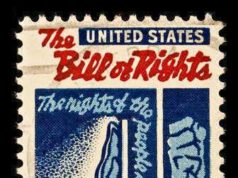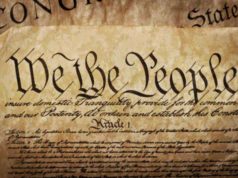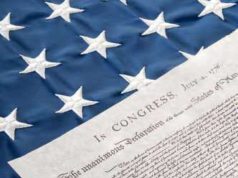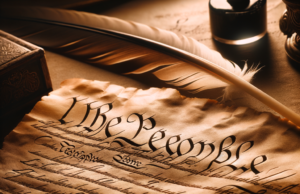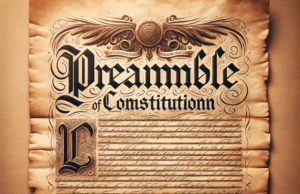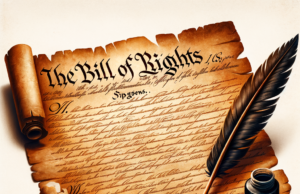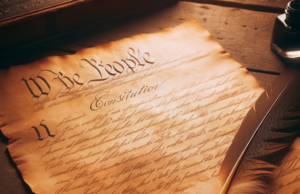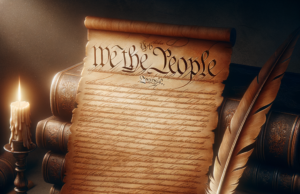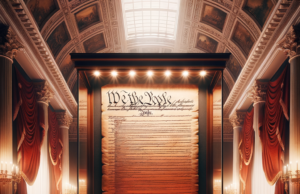Table of Contents
- 0.1 Introduction
- 0.2 Origin and Development of the Bill of Rights
- 0.3 Significance and Impact of the Bill of Rights
- 0.4 Importance of the Bill of Rights Today
- 0.5 Unique Aspects of the Bill of Rights
- 0.6 Conclusion
- 1 1st Amendment-
- 2 2nd Amendment-
- 3 3rd Amendment-
- 4 4th Amendment-
- 5 5th Amendment-
- 6 6th Amendment-
- 7 7th Amendment-
- 8 8th Amendment-
- 9 9th Amendment–
- 10 10th Amendment-

Introduction
Bill of Rights is a document that defines and describes the fundamental rights of individuals. It was originally created to limit the power of the government and protect the lives and liberties of the citizens from being abused. Since its inception in the United States of America in 1791, it has inspired many other nations to adopt similar documents in order to protect the rights of their citizens.
In this article, we will provide a detailed analysis of the Bill of Rights. We will discuss its origin and development, its significance and impact, and its importance in contemporary society.
Origin and Development of the Bill of Rights
The origin and development of the Bill of Rights can be traced back to the early history of the United States. After the American Revolution and the formation of the new nation, the Founding Fathers sought to establish a set of basic principles that would guide and govern the new government.
One of the primary concerns of the Founding Fathers was the need to limit the power of the government and prevent it from abusing the rights of the citizens. In order to achieve this, they drafted a set of amendments to the Constitution. The first ten amendments are collectively known as the Bill of Rights.
The Bill of Rights was officially ratified on December 15, 1791. It consisted of ten amendments, each of which addressed different aspects of individual rights. For example, the First Amendment provided for freedom of religion, speech, and the press, while the Fourth Amendment protected citizens from unreasonable searches and seizures.
Significance and Impact of the Bill of Rights
The Bill of Rights had a tremendous impact on the United States of America and the world. It established the fundamental rights that every individual is entitled to, regardless of race, ethnicity, religion, or any other characteristic.
Perhaps most importantly, the Bill of Rights limited the power of the government and protected the rights of the citizens. It ensured that the government could not trample on the freedoms and liberties of the people and that the people could hold the government accountable for its actions.
The Bill of Rights also had a far-reaching impact on the rest of the world. It inspired many other nations to adopt similar documents that protected the rights of their citizens. It became a symbol of freedom and democracy and helped to shape the political and social systems of many countries around the globe.
Importance of the Bill of Rights Today
The Bill of Rights remains as important today as it was more than two centuries ago. In a world where authoritarian regimes are on the rise and the rights of individuals are under threat, the Bill of Rights serves as a powerful reminder of the importance of individual freedoms and liberties.
The Bill of Rights also plays a critical role in advancing social justice and equal rights. It ensures that individuals are not discriminated against based on their race, ethnicity, religion, or any other characteristic. It also provides for due process and equal protection under the law, ensuring that everyone is afforded the same rights and opportunities.
Moreover, the Bill of Rights has been continuously updated and modified to reflect the changing needs of the society. For example, the 19th Amendment, ratified in 1920, provided women with the right to vote, while the 26th Amendment, ratified in 1971, lowered the voting age to 18.
Unique Aspects of the Bill of Rights
The Bill of Rights contains several unique and important aspects that are worth highlighting.
One such aspect is the establishment of the right to bear arms, as specified in the Second Amendment. This provision has been the subject of much debate and controversy in recent years, with some arguing that it permits individuals to own and use firearms for self-defense while others argue that it poses a threat to public safety. Regardless of one’s personal stance on the issue, the Second Amendment remains a foundational component of the Bill of Rights and a defining characteristic of American society.
Another unique aspect of the Bill of Rights is the provision for freedom of speech and the press, as specified in the First Amendment. This provision has played a critical role in shaping American democracy and allowing for the free exchange of ideas and opinions. It has also been the subject of much debate and controversy, particularly in the context of hate speech and offensive language.
Conclusion
In conclusion, the Bill of Rights is a critical component of American democracy and a symbol of freedom and individual liberties around the globe. Its origin and development, significance and impact, and importance in contemporary society all demonstrate its continuing relevance and importance. The Bill of Rights remains a foundational document of our society and a powerful reminder of the importance of individual rights and freedoms.
The Bill of Rights, or the first ten Amendments of the Constitution, are the undeniable rights awarded to American citizens. Published over 200 years ago, these rights still hold incredible significance as it pertains to present-day society.
When they were first introduced, the Bill of Rights only extended to matters overseen by the Federal Government. Trials or instances where the rights were in question did not associate with State governments until the early 1890s. Using the 14th Amendment as its platform, the United States extended the reach of the Bill of Rights to state governments through the incorporation doctrine.
The 14th Amendment of the United States Constitution provided American citizens with a broad definition of their undeniable rights. The Due Process Clause, perhaps the Amendment’s most important subsection, recognizes a series of substantive due process rights including parental, marriage, and procedural rights. The Due Process Clause enabled State governments to recognize the liberties offered in the Bill of Rights to individuals. It simply forced the Government to respect all legal rights established in the Constitution.
Prior to adoption and subsequent ratification of the 14th Amendment, the Supreme Court consistently held that the Bill of Rights applied specifically to the Federal Government. Inclusion into State law arose in the early 1890s when a series of Supreme Court questioned the credibility of the first 10 Amendments on a State level.
The two most notable Supreme Court cases which sparked the genesis of the incorporation doctrine was Chicago, Burlington, and Quincy Railroad v. City of Chicago(1897) and Gillow vs. New York(1925). In each of these cases, the Supreme Court ruled that the individual State governments were bound to uphold the particular civil liberties awarded in the Constitution.
In the Quincy Railroad case the Supreme Court ruled that some form of just compensation is required for property appropriated by State or local governments. This particular ruling upheld and extended the rights detailed in the 5th Amendment to Quincy as they pertained to State governments.
The 1925 Supreme Court case of Gitlow vs New York is perhaps the most notable inclusion of the Bill of Rights into state law. Benjamin Gitlow was an American socialist who was convicted of criminal anarchy for his role in the production of a Communist publication-“The Left Wing Manifesto.” The courts claimed that Gitlow was attempting to augment a violent overthrow of the Government through his publication and teachings.
Although the New York court found him guilty, the Supreme Court upheld Gitlow’s rights to free speech and free press and later freed him of charges. The Court stated in its decision, “for present purposes, we may assume that freedom of speech and of the press…are among the fundamental personal rights and liberties protected by the due process clause of the Fourteenth Amendment from impairment by the State.” The Supreme Court’s ruling was a fundamental starting point for the Bill of Rights to be observed and respected by State law.
Rulings such as Burlington and Quincy Railroad v. City of Chicago(1897), and Gillow vs. New York(1925) have cemented the inclusion of the Bill of Rights into state law. However, there are a few Amendments, due to their broadness, ambiguity, or archaic nature, which have not been incorporated into State governments. Below is a listing of the Amendments found in the Bill of Rights and their status in regards to State law.
1st Amendment-
- Establishment of religion-incorporated
- The free exercise of religion-incorporated
- Freedom of speech-incorporated
- Freedom of the press-incorporated
- Freedom of assembly-incorporated
2nd Amendment-
- The right to bear arms is not incorporated against the states.
3rd Amendment-
- Freedom of quartering soldiers is not incorporated against the states.
4th Amendment-
- Protection against unreasonable search and seizure-incorporated● Various requirements for warrants-incorporated● Judgments pertaining to unreasonable acquisitions of warrants-incorporated
5th Amendment-
- The right to indictment by a grand jury has not been the incorporated-the majority of state constitutions have previously upheld this right.● Protection against double jeopardy-incorporated● Protection against self-incrimination-incorporated
6th Amendment-
- Right to a speedy trial-incorporated
- Right to a public trial-incorporated
- Right to trial by impartial jury-incorporated
- Right to notice of accusations-incorporated
- Right to confront adverse witnesses-incorporated
- Right to the assistance of counsel-incorporated
7th Amendment-
- The right to a jury trial in civil cases is not incorporated against the states.
8th Amendment-
- Protections against “excessive” bailor “excessive” fines have not been incorporated against the states.● Protection against cruel and unusual punishment-incorporated
9th Amendment–
- Rights of the people that are not specifically detailed in the Constitution are not incorporated against the states.
10th Amendment-
- Powers not granted to the national Government and reserved to the states and the people-incorporated.

